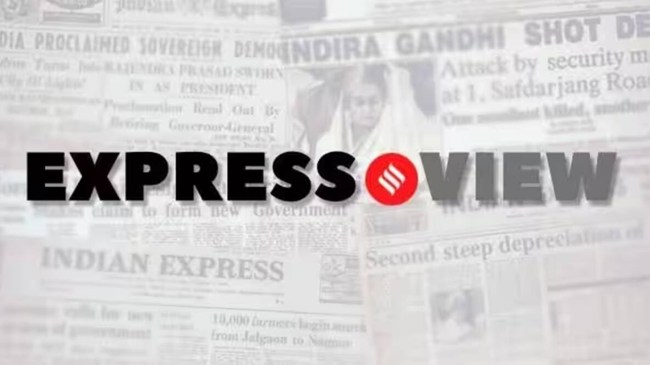Opinion Express View on draft UGC guidelines: Campus unfreedom
Liberalising appointment rules in universities is welcome. But giving Raj Bhavans decisive say in VC appointment goes against NEP’s objectives.
 The draft rules will be in the public domain for about a month.
The draft rules will be in the public domain for about a month. More than three-and-a-half years after the government announced that it would implement a new National Education Policy (NEP), the task of reforming higher education institutions remains a work in progress. The challenge is to remove persisting deficits and enable universities to cater to the demands of the modern knowledge economy. Addressing these imperatives requires the higher education regulator, UGC, to not just set standards but also act as an enabler. In the past, the agency has attracted criticism for its tendency to over-regulate. The draft UGC (Minimum Qualifications for Appointment and Promotion of Teachers and Academic Staff in Universities and Colleges) Regulations 2025 signal a welcome change in the regulator’s approach, but only to an extent. Stringent rules that made undergraduate and postgraduate degrees the qualifying criteria to teach a discipline have been relaxed. This flexibility in recruitment aligns with the NEP’s effort to break disciplinary silos. Equally significant are the provisions that allow senior industry experts and public administrators to apply for a VC’s post. Lifting the cap on contract jobs, one hopes, will be used to attract diverse talent and not keep the talented insecure and beholden to their bosses. However, by strengthening the role of state governors in appointing university heads, the draft rules mark a disappointing departure from the NEP’s thrust on institutional autonomy. Worse, they signal once again that the sarkar, in this case, the Centre, is the arbiter of excellence.
Opening the VC’s post to professionals outside academia could increase the pool of experts required to helm higher education institutions. The move creates possibilities for collaboration between academia and industry — key at a time the contours of higher education are being reshaped by technology. The salience of this cannot be overstated when the higher education system, barring select institutions, has been impervious to the imperatives of an aspiring society, especially the skill deficits in the young. Realising the potency of these liberalising initiatives, will, however, require unshackling the university ecosystem from the centralising tendencies of the past, when several VCs were treated as political appointees. That universities are caught in the crossfire between governors and state governments — especially in non-BJP-ruled states such as Kerala, West Bengal and Tamil Nadu — shows that academic freedom in the country’s higher educational institutions continues to be a fraught issue. In the draft rules, the clause empowering state governors, as chancellors, to constitute a search committee to find VCs undermines the university’s autonomy. Raj Bhavan and the UGC will have one nominee each in this three-member panel, while the university will have just one representative.
Opposition-ruled governments are upset at the prospect of what’s tantamount to a Central veto in the appointment of VCs. To get the best person to lead a campus needs a process that insulates the campus from political pressure — from the Centre as well as from state governments. A TMC loyalist chosen as a VC in West Bengal or a CPM member in Kerala could be as damaging to a campus as one imposed by Raj Bhavan. The UGC would do well to study how some of the more progressive institutions in the world give a say to participants in the system — faculty bodies, domain experts, even student associations — in choosing heads of institutions. The draft rules will be in the public domain for about a month. The government must reach out to invite a range of ideas and voices; give greater thought to designing rigorous appointment procedures that are insulated from party politics and, most importantly, resist the temptation of believing that a good rubber-stamp makes for a good academic leader.






